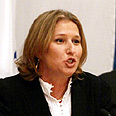
Livni. 'Not the government's policy'
צילום: דודי ועקנין
Livni criticizes settlement plan
Foreign minister says plan to expand Jewish settlement in the West Bank unhelpful, but insists it will not prejudice final peace deal under negotiation with Palestinians
Foreign Minister Tzipi Livni on Wednesday criticized a plan to expand a Jewish settlement in the West Bank as unhelpful but insisted it would not prejudice a final peace deal under negotiation with Palestinians.
Israel's plan to build hundreds of homes in a settlement outside Jerusalem, announced after a Palestinian gunmen killed eight Israelis at a religious seminary last week, has sparked an international outcry that was joined by US Secretary of State Condoleezza Rice on Wednesday.
In an apparent bid to ease pressure from Israel on the issue that has threatened to derail fragile peace talks, Livni told students at Harvard University in Cambridge, Massachusetts, "It's not the Israeli government policy to expand settlements these days."
Livni, formerly of Israel's Mossad spy agency and now a top deputy to Prime Minister Ehud Olmert, characterized the planned construction as private building and "not dramatic."
"Basically, I don't think that it helps," Livni said. "We decided to stop settlement activities."
She added that Israel would "need to dismantle more settlements" under a peace deal for a two-state solution to the Israeli-Palestinian conflict that US President George W. Bush has said he hoped to see before he leaves office in 2009.
Livni said Israel's 2005 troop pullout from the Gaza Strip, which removed some 8,000 Jewish settlers, was a signal Israel would eliminate more controversial enclaves for peace.
She also seemed to rule out any plan by Israel to recapture the coastal strip despite the latest border tensions, saying, "Israel left the Gaza Strip not in order to come back."
'Time of the essence'
Livni, who has headed Israeli negotiations with the Palestinians since talks were jump-started by a US-brokered November summit, said, "time is of the essence" for reaching a peace deal, as militants gained ground in the region.She said Israel needed little world involvement in mediating a peace deal, and hoped moderate Israelis and Palestinians were determined enough to do so on their own.
"I believe there is hope, I believe there is opportunity," said Livni, whose optimism seemed to defy the continued tensions along the Israeli frontier with Gaza, where Hamas Islamist militants wrested control from President Mahmoud Abbas's Fatah movement last year.
"I know the Israeli-Palestinian conflict is the sexiest conflict in the world and everyone wants to be involved," said Livni, who visited Washington earlier in the week. "I think the world should leave it to us. There is no need to push us. It is about our lives."
In a speech earlier in Boston to Massachusetts lawmakers, Livni urged the international community to tighten pressure on Iran to halt its nuclear program that Tehran insists is for peaceful energy purposes, but which the West says could lead to production of nuclear weapons.
"We must increase the pressure on the Iranian leadership now if we want to avoid difficult dilemmas in the future," Livni said.
"The clock is ticking," she added.










